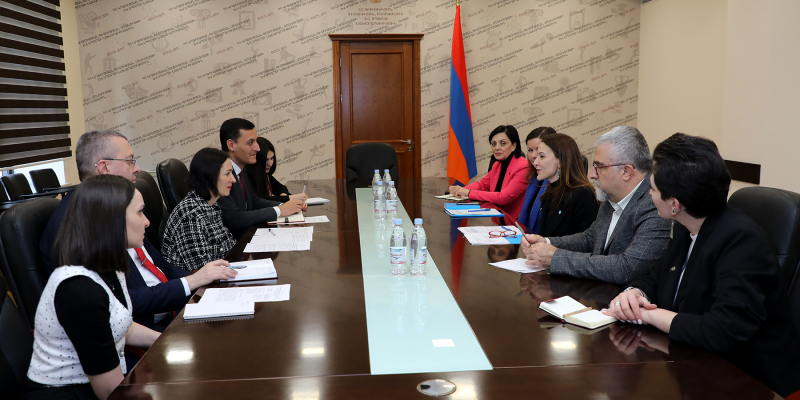RA Minister of Education, Science, Culture and Sports Zhanna Andreasyan received Director of the UNICEF Regional Office for Europe and Central Asia Regina De Dominicis.
ESCS Deputy Minister Arthur Martirosyan and UNICEF Representative to Armenia Christine Weigand also attended the meeting.
The ESCS Minister greeted the guests and emphasized the efficient collaboration with UNICEF across different areas, encompassing both sectoral programs and additional challenges that arise during difficult times.
Zhanna Andreasyan emphasized the significance of the Organization's contribution to the development of the “RA Education Development State Program until 2030” and its execution. In this regard, the ESCS Minister emphasized the active cooperation within the framework of the “Global Partnership for Education” program and highlighted the efforts of the Organization as co-chair of the working group “Humanitarian Response to the Educational Needs of Children and Youth Forcibly Displaced from Nagorno-Karabakh”.
“We are willing to expand collaboration in all necessary sectors,” noted Zhanna Andreasyan.
Regina De Dominicis, Director of the UNICEF Regional Office for Europe and Central Asia, expressed gratitude for the reception and emphasized the significance of productive educational collaboration with Armenia.
She appreciated the large-scale reforms implemented by the RA Government at all levels of education. Regina De Dominicis, in particular, emphasized the work carried out in the direction of inclusive and preschool education, digitalization strategies, the introduction of the new state standard of general education, as well as the activities on the development of the law “On Youth”.
During the meeting, the sides also discussed the issue of ensuring the right to education for children who were forcibly displaced from Nagorno-Karabakh. The Minister informed that more than 17,000 such students have been enrolled in public schools in the regions of Armenia and Yerevan. Additionally, over a thousand students are continuing their education in colleges and vocational schools. Universities are also offering relevant specialties to train these forcibly displaced students.
“The differences in the education systems of Armenia and Nagorno-Karabakh raise certain issues. In Armenia 12-year education is compulsory, and 9-year education was compulsory in Nagorno-Karabakh. Now we have an issue with enrolling children of this age group in schools as well,” stated Zhanna Andreasyan, emphasizing the significance of social workers' roles in identifying out-of-school children.
At a meeting with the Director of the UNICEF Regional Office for Europe and Central Asia, the ESCS Minister also expressed gratitude for the support provided to the activities in the youth sphere, especially emphasizing the importance of the opportunity to share legislative experience of other countries in the development of the law “On Youth”.
Additional bilateral issues were discussed during the meeting, and a commitment was made to enhance the efficiency of ongoing cooperation through joint efforts.







